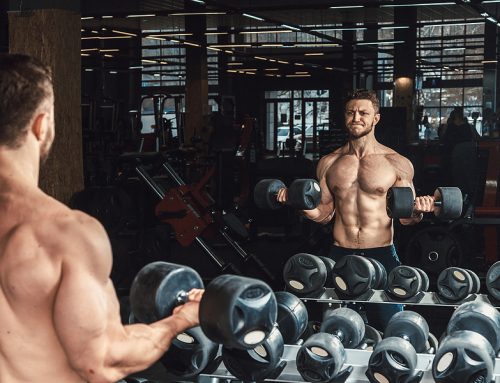Protein myths was the topic of the most recent quiz I posted to our Burn the Fat, Feed the Muscle (BFFM) Facebook fan page group. We have a large and very engaged group there (152,000 BFFMers following at www.facebook.com/burnthefat) and it’s always fun to see all the responses to these kinds of quizzes.
The last two quizzes were about metabolism and post workout nutrition. After posting on Facebook first, I turned them into blog posts. If you missed those last two posts, be sure to scroll back and take a look.
Once again, in the protein myths quiz, a lot of people were stumped. Almost everyone thought for sure that at least one or two of these myths was true. I must admit, years ago I believed a few of these myths myself. The science of optimal protein intake has advanced a lot since then.
Also I wouldn’t say these were “trick” questions, but they are tricky. Protein prescription can be very, very nuanced.
Check out the list below and the short explanations for why they are myths. How many of these protein myths did you still believe? Drop a note in the comments below and let me know. If you want to learn more, check out the links to science references at the end or post your questions in the comments.

1. Extremes of high protein intake (1.5 g/lb/bw/day) can be harmful to kidney function.
False. In a study by Antonio et al, healthy subjects consuming up to 3.3g/kg/day (1.5g/lb) had no negative effect on any health markers, including blood lipids and kidney function, over a 4 month period. However, high protein diets are contraindicated in people with pre-existing kidney disease. (1)
2. Protein myth: People who lift weights with high volume and intensity need to eat at least 1 gram of protein per pound of body weight to optimize muscle gains.
False. While 1 gram per pound of bodyweight (2.2g/kg) is a standard practice for resistance trained athletes (and even higher when dieting), a review of the science literature (Morton et al) indicates that this is the top end of the recommended range which runs from 1.6g to 2.2 kg/bw/day. Evidence suggests that in a calorie-sufficient diet, muscle gains are not likely to be greater with protein intakes higher than .8 g per pound of body weight per day. (2)
3. There’s no scientifically supported reason to eat more than 1 gram of protein per pound of body weight.
False. While there is no evidence that eating more than 1 gram of protein per pound of body weight will build more muscle in calorie sufficient diets, for lean, calorie-restricted physique athletes, higher intakes may help prevent muscle loss during contest prep / dieting. Higher protein has also be shown to improve satiety / fullness.
In one scientific review, the author suggested 2.3 to 3.1 g/kg lean body weight, with the protein scaled up the leaner the athlete and the more aggressive the calorie deficit. In addition, recent research has suggested that protein overfeeding is less likely to be converted to fat and that recomposition is more likely with very high protein diets. (3)
4. Your body can only digest, absorb, and utilize for muscle growth 30 to 40 grams of protein per feeding.
False. While many people do hit their daily protein goal by eating 30 to 40 grams in multiple small meals, research has determined the maximum amount of protein per meal likely to be used for muscle growth is 0.4g to 0.55g/kg per meal (possibly 0.6g/kg/meal).
For a 200 pound man, thats almost 50 grams of protein. If this individual were to eat 60 or 70 grams in a meal, it would all be digested but not all used specifically for muscle growth. (4)
5. Consuming protein 5 to 6 times a day is optimal for stimulating muscle protein synthesis and maximizing muscle growth.
False. A high meal frequency of 5 to 6 times a day is still widely practiced and often preferred by bodybuilders, who get great results doing it. However, research shows that 4 intakes of protein, spread across the day is likely sufficient in most scenarios. For most people with weight loss goals (not bodybuilders), 3 protein feedings a day is fine, as long as optimal totals for the whole day are met. More frequent protein feedings make it easier to hit total daily intake goals (5)
6. The timing of protein intake relative to resistance training is more important than the total daily protein intake.
False. Distribution and timing of protein does matter, but research on nutrient timing shows that total daily protein intake is by far the highest priority. Make sure you’re hitting your daily total first, then worry about timing. (6)
7. Older adults don’t need as much protein as younger people.
False. Studies have confirmed that older adults experience anabolic resistance and therefore are advised to increase protein or aim for the higher end of the recommended ranges. (7)
Train hard and expect success!
Tom Venuto,
Author, Burn the Fat Guide to Flexible Meal Planning For Fat Loss
Founder, Burn the Fat Inner Circle
PS. Not an Inner Circle member yet? Join us today! Click here to join thousands of fellow burners

Tom Venuto has been a trusted natural bodybuilding and fat loss expert since 1989. He is also a recipe creator specializing in fat-burning, muscle-building cooking. Tom is a former competitive bodybuilder and today works as a full-time fitness coach, writer, blogger, and author. In his spare time, he is an avid outdoor enthusiast and backpacker. His book, Burn The Fat, Feed The Muscle is an international bestseller, first as an ebook and now as a hardcover and audiobook. The Body Fat Solution, Tom’s book about emotional eating and long-term weight maintenance, was an Oprah Magazine and Men’s Fitness Magazine pick. Tom is also the founder of Burn The Fat Inner Circle – a fitness support community with over 55,000 members worldwide since 2006. Click here for membership details
Scientific References:
1. Antonio J et al. The effects of a high protein diet on indices of health and body composition-a crossover trial in resistance-trained men, J Int Soc Sports Nutr, 16;13:3, 2016 (pub med)
2. Morton R, et al, A systematic review, meta-analysis and meta-regression of the effect of protein supplementation on resistance training-induced gains in muscle mass and strength in healthy adults, Br J Sports Med, 52(6):376-384, 2018/ (pub med)
3. Helms E, A systematic review of dietary protein during caloric restriction in resistance trained lean athletes: a case for higher intakes, Sport Nutr Exerc Metab, 24(2):127-38, 2014 (pub med)
4. Schoenfeld B, Aragon A, How much protein can the body use in a single meal for muscle-building? Implications for daily protein distribution, Int Soc Sports Nutr, 27;15:10, 2018.(pub med)
5. Yasuda, J, Evenly Distributed Protein Intake over 3 Meals Augments Resistance Exercise-Induced Muscle Hypertrophy in Healthy Young Men, 1;150(7):1845-1851, 2020. (pub med)
6. Aragon A, Schoenfeld B, Nutrient timing revisited: is there a post-exercise anabolic window?, 29;10(1):5, 2013. (pub med)
7. Paulussen K et al, Anabolic Resistance of Muscle Protein Turnover Comes in Various Shapes and Sizes, Front Nutr, 5;8:615849, 2021. (pub med)






Hi! You wrote in protein myth no.2 that the average amount of protein intake is 1.6g – 2.2kg!!/bw/day? Is that correct?
That is correct. For people who are lean or average body fat (not overweight) and doing resistance training, optimal protein intake for building and maintaining muscle is 1.6 to 2.2g/kg/bw/day which equals .75 to 1.0 g per lb bw per day. However, protein prescription can be nuanced. When dieting in a deficit, there are advantages to aiming for the upper end of that range, in fact competitive bodybuilders often go well over 1g per lbs per day during contest dieting.
Hey there, I’m Stefan, and I just read your blog. It’s really impressive and helpful. I found a good piece of information on the benefits of planking exercises on your blog. . I really appreciate the knowledge you shared with us. Keep updating such informative content.